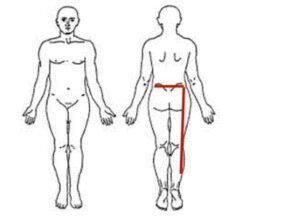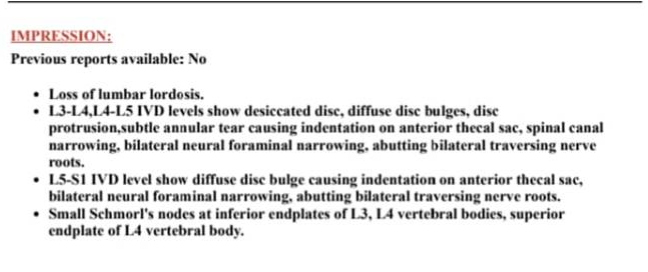When the Spine Speaks Through the Leg: A Case Analysis
Patient profile :
Age and Gender – 22-year-old male
Occupation – student studying for the UPSC exam
Complaints – low back pain and right leg pain
History
In May 2024, while performing RDL with a 50 kg barbell, a sudden, sharp pain developed in the lower back, accompanied by a mild cracking sound. The pain persisted in the lower back and gradually radiated to the back of the right leg.
After that, he consulted a doctor and took an MRI. He was told that he has a disc bulge with nerve compression. The doctor prescribed painkillers and suggested undergoing physiotherapy management that includes IFT and traction for one month; the pain got reduced. Also, he avoided going gym for 6 months.
In December 2024, he resumed going to the gym. A few days later, while doing leg extension with 60 kg, he developed mild back pain again. A week later, when he did 40 kg hack squats, he experienced a sudden sharp back pain after which he was not able to straighten his right knee. He also reported numbness and radiating pain in his right leg. After that, he came for a consultation with us.
Training load on the day of pain onset:
Squat – 40kg(4 sets)
Leg extension -40 to 60kg ( 4sets)
Hack squats – 40kg ( 3 sets)
After that leg day, he started feeling pain in his lower back and the back of his right leg
No past medical history or injury.
Physical activity status:
From Jan 2024 to May, 2024, he did strength training intermittently, without a proper training program. No training after pain onset in May 2024.
He began strength training again in December 2024. Pain recurred in the middle of December. No other physical activity. He was being sedentary as he sat for about 10-12 hours every day for studying.
Sleep:
He sleeps 4 to 5 hrs(poor sleep).
Stress:
He was stressed as he had the UPSC exam interview in Delhi within a month, and he was worried about the pain during travel.
Objective and expectation:
He wants to become pain-free while lifting weights.
2)PAIN ANALYSIS:
1) Intensity – 8/10
2) Aggravating factor – more than 5 minutes of sitting, standing, walking, cough & sneeze
3) Relieving factor – Rest, lying
4) Location –Low back belt region, radiating to the posterior side of the right leg

5) Duration – 1 week of severe pain, previously on/off pain for 6 months (from May 2024)
6) Type of pain – Neuropathic pain
7) Character- continuous pain
8) Irritability – High (pain spikes up within 5 minutes of an activity )
9) Sensitivity – High (takes longer to settle )
10) Lifestyle Impact – high (impact on daily activities )
11) Fear of movement – significant pain-related fear present during forward bending, RDL, and squats.
Psychosocial factor analysis:
Cognitive: not affected, he has clarity in his thoughts on pain.
Affective: Slightly affected. He’s worried as his daily activities, and studying are affected.
Social: Not affected much.
Clues from the history and pain analysis:
He is leading a sedentary lifestyle as he is studying for UPSC exam. Because of that, he sat in the same place for more than 10 to12 hours. Even though he was going gym every day for one hour, he is not physically active for the rest of the day.
Also, he does not follow a proper programmed strength training and also irregular with the training. Further we need analyse his mobility, strength, and load management to understand the reason for his pain..
3)PHYSICAL EXAMINATION:
1) Observational findings:
There is no swelling and redness, and no change in gait.
2) ROM analysis:
| Range of Motion | Right | Left |
|---|---|---|
| Hip Internal Rotation | 25-30 degree | 25-30 degree |
| Hip External Rotation | 10-20 degree | 30-40 degree |
| Hip flexion (supine – SLR) | Unable to do, due to pain | 40-50 degree |
3) Mobility screening:
Forward bending – poor (unable to touch the front thigh)
Overhead squat – poor ( unable to squat below 90°, hip shifted to left side,)
4) Stability screening:
Strength testing- Isometric break test:
| Muscle Group | Right | Left |
|---|---|---|
| Hip abductors | Weak, painful | Strong, painfree |
| Hip adductors | Weak, painful | Strong, painfree |
| Hip flexors | Relatively weak | Strong, painfree |
| Hip extensors | Strong, painfree | Strong, painfree |
Single leg sit to stand: unable o perform in both the legs.
4) Stability screening:
No pain on palpation
6) Special tests:
SLR – Positive
Crossed SLR – Positive
Slump test – Positive
SI joint (Laslett Cluster tests – compression, distraction, ganslen’s test, thigh thrust, sacral thrust tests) – Negative
Shopper’s cart- negative
4) INVESTIGATION: MRI

5)DIFFERENTIAL DIAGNOSIS:
Lumbar canal stenosis
- No bilateral involvement.
- Shopper’s cart sign- negative (forward bending is not pain-free)
Cauda equina syndrome
- No motor or sensory loss
- No loss of bladder and bowel control
Gluteal tendinopathy
- No history of heavy sports activity to trigger
- No pain on palpation
SI joint dysfunction
- No morning stiffness and
- No pain in sudden hip rotation
- SI joint Cluster test negative
6)DIAGNOSIS:
DIAGNOSIS
- Lumbar radiculopathy.
Validation:
- Neural symptoms (numbness) are present,
- Radicular pain- pain radiating along the nerve courses from low back hamstring to calf muscle .
- Cough and sneeze aggravate the pain
- Leg extension causes sharp pain on low back .
- SLR, Cross SLR ,Slump test – all positive.
7)TREATMENT PLANNING:
Belief and expectation from the patient – He wants to lift the weight without pain and live a pain-free life.
Things need to be focused on in treatment- Nerve mobilization, lower back and abdominal muscle strengthening and mobility.
Detailed treatment planning strategy
Patient education
- Clear explanation about condition
- dos and don’ts
- correcting their disbelief and fear of movement
Week 1 : Relaxation and nerve gliding
- Breathing exercises
- diaphragmatic BE
- kettlebell DBE
- core bracing
- Nerve gliding ( sciatica nerves)
Week 2-3 : Low back and abdomen strengthening
- Curl up
- Dead burg
- Isometric dead burg
- Side plank
- Cat and camel
- Bird dog
- Superman exs
Week 4-5: Mobility exercise for hip
- Progess lowback and abdomen strengthening exercises
- Core rotation exercises
- Basic leg strengthening exercises
- Glute bridging